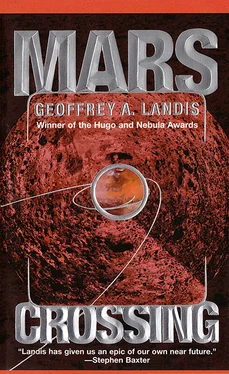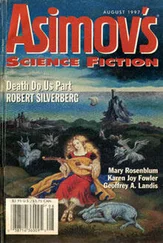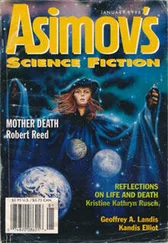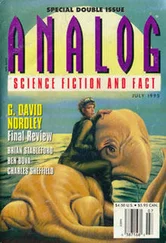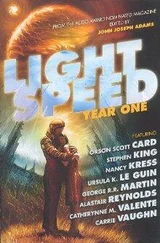The launch was on a cold and cloudy day. The wind was so high that they had been certain that the launch would be canceled, but they went out to the public beach with their binoculars, their cameras, and a small battery-powdered radio. The tide line was covered with seaweed and the drying corpses of Portuguese men-of-war, improbably bright blue balloons slowly deflating in the air.
The Delta had launched on the exact second the launch window opened. It climbed silently into the air, the light of the solid rocket boosters sparkling a trail across the choppy water, almost too bright to look directly at, and then vanished into the clouds. For a few seconds the cloud glowed with the light of the booster, and then it faded, and there was nothing left but the empty pad and the white smoke.
Only then did the sound come rolling across the water, a roar so intense that you could feel it as well as hear it. And then that, too, faded into the distance, and there was only the surf and the seagulls.
Not one of the Minions was old enough to drink, so when the announcement came that the launch had been a success, they celebrated by pouring grape juice over each other.
The satellite—and more particularly Ryan’s control systems—worked perfectly, taking photographs of the polar aurorae for over a year.
Ryan spent that year going to classes when he had to, but never far enough away from the satellite control center that he could not be paged to return at an instant’s notice.
The control center consisted of a few computers and a fast Internet connection hooked up in a windowless room in the basement of the wind tunnel building. With the launch, the tight group of the Minions began to drift away to other projects and other concerns. Dave left for a year in Israel, Darlene got involved in a new project in the physics department, Anu quit to start up a software firm and become a millionaire, Steve got married and stopped coming around, and Ted simply declared that he needed to spend time on coursework, and wasn’t about to let the satellite run his life.
There were new undergraduates to help out, bright-eyed and eager, but of the original Minions, only Ryan stayed with the project to the end. Whenever anything went wrong, Ryan was there to debug the problem and design a work-around for it. They found that he had a talent for visualizing orbital mechanics, and an almost mystical understanding of the secret world of torque wheels and magnetic dampers and predictive control systems. He could figure out, from the slightest bump in a chart, which part was failing, how the underperformance was affecting the satellite, and what was needed to write a software patch to keep the satellite running.
For Ryan, it was not just a student project. It was his life.
It was a task that Ryan dreaded, but there was no help for it. Agamemnon expedition had left behind a complete set of high-bandwidth communications gear and a gimbaled high-gain antenna. He had to call Earth.
After inflating the Agamemnon ’s main operations habitat, it took him an hour to get the communications gear powered up and to reset the computer to calculate the position of the Earth and adjust the antenna to track it. He almost hoped that the antenna would fail to lock on to the Earth; fixing that would give him another few hours to avoid making the connection. But no such luck.
At least he didn’t have to do it alone. He called in Estrela and Tana. “We’re all in this together,” he said. “Ready?”
Estrela nodded, tossed her hair, and attempted a wan smile. Tana said, “Ready.”
He flicked on the camera and began transmitting.
“Earth, Don Quijote . This is Ryan Martin, Tanisha Jackson, and Estrela Conselheiro, calling in. We’ve reached the Agamemnon site at Acidalia Planitia.” He paused. That was the easy part. “It is with great regret,” he said, and then stopped. He didn’t even know what to say . He looked over at Tana, but she shook her head infinitesimally and mouthed silently, “you.” He turned back to the camera. “I regret to inform you that, uh, we’ve killed off—I mean, we’ve had some casualties here. Uh, that is, we. Shit. I hate doing this. Look, it’s like this.” He took a deep breath, and then said quickly, “We’ve had a bit of a hard time here, and Captain Radkowski and Bran—Trevor Whitman are dead. Got that?”
He turned off the camera, and slumped down. “Okay, it’s done.”
“We’re not done with the broadcast, are we?” Tana said. “We have to tell them more than that. And I thought we were going to ask for advice.”
Ryan shook his head. “No. I mean, yes, no we’re not done.”
“Then—”
“It will be half an hour before we get a reply from Earth,” he said. “It’ll probably be a while after that before we get anybody who can give us anything we need. Don’t worry. We have time.” He composed himself, turned the transmitter back on, and then gave them a brief synopsis of how Captain Radkowski and Trevor Whitman had died. He kept it strictly to the facts, with nothing about Trevor Whitman actually being Brandon Weber, nor about their conjecture that Radkowski had been murdered.
The person who appeared on the monitor looked startled. He looked like he’d just woken up. “Uh, Don Quijote , Houston. We got you.” Ryan didn’t recognize him; he wasn’t one of the regular communicators. “Uh, this is great. Wow, it’s really great to hear from you. We were worried—” Just at the moment the news about Radkowski and Trevor must have arrived; the technician looked startled. “Wait one,” he said.
Ryan calculated the time on Earth. 05:45 Greenwich; that would make it 12:45 at night in Toronto, 11:45 at the space center in Houston. Late; they were transmitting to the second shift. No wonder they had to wait, probably had to go wake somebody up.
It was a slow conversation. Ryan and Tana talked for a while, answering some of the questions from Earth and ignoring others. Then they would break and listen to the feed from Earth, replies to their queries of half an hour ago.
First, they learned there was still no hope of a rescue mission. Ryan had never expected one; he’d asked just out of a perverse sense that he had to check the obvious. Second, they were told that the engineers on Earth had not come up with any unexpected new ideas, although not for lack of trying. Their only chance was still the Brazilian Jesus do Sul return rocket, at the pole. There were now hundreds of news reporters asking for interviews; Houston was holding them off, but did they want to talk to reporters? When their “no” answer came through, nobody seemed surprised.
“Copy that,” was the reply. “One more thing for you. Hold on a moment. I think you may want to hear this directly from our orbital mechanics guy.”
The orbital mechanics guy, as it turned out, was a middle-aged woman. Ryan recognized her; what was her name, Lorentz? She had a reputation for being both hard-working and smart. She spoke in a Texas accent, launching in without bothering to say hello first. “We tracked down the complete specs on that Brazilian rocket, checked it out against a matrix of trajectories available for your launch window. Here’s the lowdown. Stripped to the bone, no rock samples, dump all the spare supplies, no margin for underperformance: You’ll have fuel for one hundred and forty kilograms of human payload. That’s top; you’d be wise to leave a little margin.”
“Copy,” Ryan said. “What if we—” Then he stopped. If they what?
What could they think of that the ground engineers hadn’t already thought of? If she said one hundred and forty kilograms, that was the end of it.
Читать дальше
